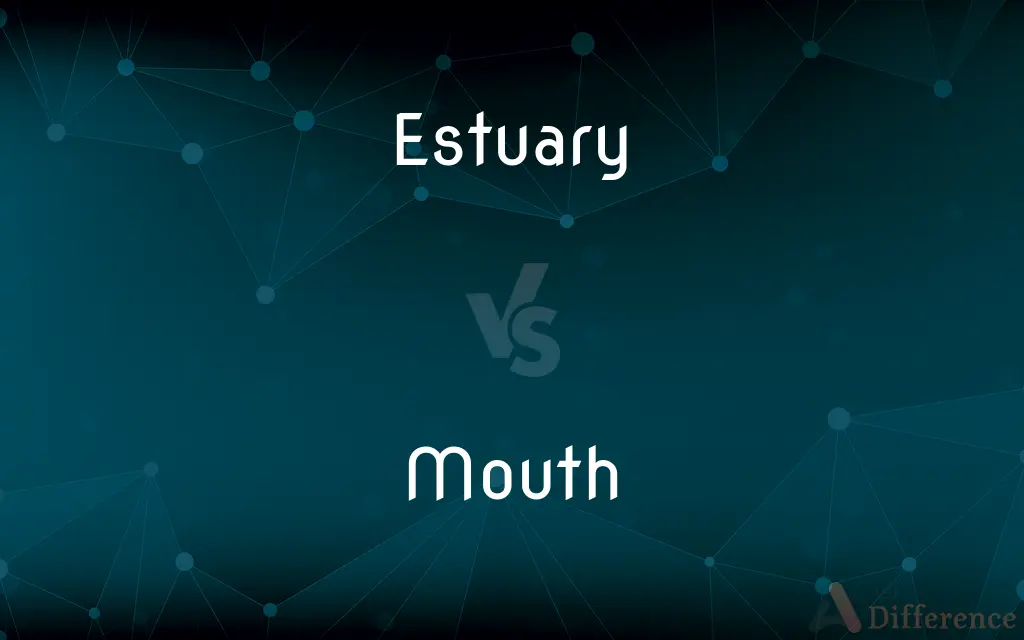Estuary vs. Mouth — What's the Difference?
By Tayyaba Rehman & Fiza Rafique — Updated on March 28, 2024
Estuaries are semi-enclosed coastal bodies of water where fresh and saltwater mix, whereas mouths are the points where a river meets an ocean, sea, or lake.

Difference Between Estuary and Mouth
Table of Contents
ADVERTISEMENT
Key Differences
Estuaries are dynamic environments where rivers meet the sea, creating a unique mixture of salty and fresh water, which fosters diverse ecosystems. On the other hand, a mouth is the end point of a river, where its waters discharge into a larger body of water, which can be an estuary, a sea, or a lake, but without the specific ecological characteristics.
While estuaries are characterized by their brackish water, which supports a wide variety of life forms, including fish, birds, and plants adapted to varying salinity levels, mouths are primarily defined by their geographical and hydrological function as the exit points of rivers. The biodiversity in estuaries is often higher than in river mouths.
Estuaries play a crucial role in the lifecycle of many marine species as breeding and nursery grounds due to the protection they offer from predators and the abundance of nutrients. Mouths, whereas, are important for their role in sediment transport, depositing materials carried by the river into larger bodies of water.
The formation of estuaries is influenced by factors such as tides, river flow, and geological activity, leading to various types such as coastal plain estuaries and tectonic estuaries. The formation of a river mouth, on the other hand, is largely determined by the course of the river and the topography of the land where it meets a larger water body.
Estuaries are often the sites of major ports and cities due to their sheltered waters and strategic locations for trade and transportation. In contrast, mouths can be significant for similar reasons but do not necessarily provide the same level of protection or resources as estuaries.
ADVERTISEMENT
Comparison Chart
Definition
A partially enclosed coastal body of water where fresh and saltwater mix.
The point where a river meets another body of water.
Water Type
Brackish, a mix of fresh and saltwater.
Primarily fresh water entering into saltwater or another freshwater body.
Biodiversity
High, supports a diverse range of species.
Lower compared to estuaries, but varies depending on location.
Geological Formation
Influenced by tides, river flow, and geological activity.
Determined by the river's course and the land's topography.
Human Use
Often sites of major ports and cities.
Important for transportation and sometimes for settlement.
Compare with Definitions
Estuary
A habitat characterized by the mixing of freshwater and saltwater.
The estuary serves as a crucial nursery for many marine species.
Mouth
The place where a river flows into a sea, lake, or another river.
The Nile River mouth opens into the Mediterranean Sea.
Estuary
A waterbody that exhibits tidal influences.
The estuary's water level rises and falls with the tide.
Mouth
A critical point for the deposition of sediments carried by a river.
Sediments are deposited at the river's mouth, forming deltas.
Estuary
A coastal area where freshwater from rivers mixes with saltwater from the sea.
The Chesapeake Bay is a large estuary on the east coast of the United States.
Mouth
A geographical feature important for ecosystems and human settlement.
The river mouth supports a diverse range of bird species.
Estuary
An area where sediment from rivers is deposited.
Sediments carried by the river accumulate in the estuary, enriching its biodiversity.
Mouth
Often a site of significant commercial and recreational activities.
Fishing boats gather at the river's mouth due to the abundance of fish.
Estuary
A location that can buffer storm surges and flooding.
The estuary acts as a natural barrier against coastal erosion.
Mouth
The part of a stream or river that empties into a larger body of water.
Estuary
An estuary is a partially enclosed coastal body of brackish water with one or more rivers or streams flowing into it, and with a free connection to the open sea.Estuaries form a transition zone between river environments and maritime environments and are an example of an ecotone. Estuaries are subject both to marine influences such as tides, waves, and the influx of saline water and to riverine influences such as flows of freshwater and sediment.
Mouth
Can be a point of strategic importance for transportation and trade.
A port located at the mouth of the river facilitates international trade.
Estuary
The part of the wide lower course of a river where its current is met by the tides.
Mouth
In animal anatomy, the mouth, also known as the oral cavity, buccal cavity, or in Latin cavum oris, is the opening through which many animals take in food and issue vocal sounds. It is also the cavity lying at the upper end of the alimentary canal, bounded on the outside by the lips and inside by the pharynx and containing in higher vertebrates the tongue and teeth.
Estuary
An arm of the sea that extends inland to meet the mouth of a river.
Mouth
The body opening through which an animal takes in food.
Estuary
A coastal water body where ocean tides and river water merge, resulting in a brackish water zone.
Mouth
The cavity lying at the upper end of the digestive tract, bounded on the outside by the lips and inside by the oropharynx and containing in humans and certain other vertebrates the tongue, gums, and teeth.
Estuary
An ocean inlet also fed by fresh river water.
Mouth
This cavity regarded as the source of sounds and speech.
Estuary
A place where water boils up; a spring that wells forth.
Mouth
The opening to any cavity or canal in an organ or a bodily part.
Estuary
A passage, as the mouth of a river or lake, where the tide meets the current; an arm of the sea; a frith.
It to the sea was often by long and wide estuaries.
Mouth
The part of the lips visible on the human face.
Estuary
Belonging to, or formed in, an estuary; as, estuary strata.
Mouth
A pout, grimace, or similar expression:made a mouth when the teacher turned away.
Estuary
The wide part of a river where it nears the sea; fresh and salt water mix
Mouth
A person viewed as a consumer of food:has three mouths to feed at home.
Mouth
A spokesperson; a mouthpiece:acts as the mouth of the organization.
Mouth
Utterance; voice:gave mouth to her doubts.
Mouth
A tendency to talk excessively or unwisely:is known mainly for his mouth.
Mouth
Impudent or vulgar talk:Watch your mouth.
Mouth
The entrance to a harbor, canyon, valley, or cave.
Mouth
The opening through which a container is filled or emptied.
Mouth
The muzzle of a gun.
Mouth
The opening between the jaws of a vise or other holding or gripping tool.
Mouth
An opening in the pipe of an organ.
Mouth
The opening in the mouthpiece of a flute across which the player blows.
Mouth
To declare in a pompous manner; declaim:mouthing his opinions of the candidates.
Mouth
To utter without conviction or understanding:mouthing empty compliments.
Mouth
To form soundlessly:I mouthed the words as the others sang.
Mouth
To take in or touch with the mouth:Small children tend to mouth their toys.
Mouth
To orate affectedly; declaim.
Mouth
To grimace.
Mouth
(anatomy) The opening of a creature through which food is ingested.
"Open your mouth and say 'aah'," directed the doctor.
Mouth
The end of a river out of which water flows into a sea or other large body of water.
The mouth of the river is a good place to go birdwatching in spring and autumn.
Mouth
An outlet, aperture or orifice.
The mouth of a cave
Mouth
(slang) A loud or overly talkative person.
My kid sister is a real mouth; she never shuts up.
Mouth
(saddlery) The crosspiece of a bridle bit, which enters the mouth of an animal.
Mouth
(obsolete) A principal speaker; one who utters the common opinion; a mouthpiece.
Mouth
(obsolete) Speech; language; testimony.
Mouth
(obsolete) A wry face; a grimace; a mow.
Mouth
(transitive) To speak; to utter.
He mouthed his opinions on the subject at the meeting.
Mouth
(transitive) To make the actions of speech, without producing sound.
The prompter mouthed the words to the actor, who had forgotten them.
Mouth
To form with the mouth.
Mouth
(ambitransitive) To utter with a voice that is overly loud or swelling.
Mouth
To exit at a mouth (such as a river mouth)
Mouth
(transitive) To pick up or handle with the lips or mouth, but not chew or swallow.
The fish mouthed the lure, but didn't bite.
Mouth
To take into the mouth; to seize or grind with the mouth or teeth; to chew; to devour.
Mouth
To form or cleanse with the mouth; to lick, as a bear licks her cub.
Mouth
To carry in the mouth.
Mouth
(obsolete) To make mouths at
Mouth
To form a mouth or opening in.
Mouth
(sheep husbandry) To examine the teeth of.
Mouth
The opening through which an animal receives food; the aperture between the jaws or between the lips; also, the cavity, containing the tongue and teeth, between the lips and the pharynx; the buccal cavity.
Mouth
An opening affording entrance or exit; orifice; aperture;
Mouth
The crosspiece of a bridle bit, which enters the mouth of an animal.
Mouth
A principal speaker; one who utters the common opinion; a mouthpiece.
Every coffeehouse has some particular statesman belonging to it, who is the mouth of the street where he lives.
Mouth
Cry; voice.
Mouth
Speech; language; testimony.
That in the mouth of two or three witnesses every word may be established.
Mouth
A wry face; a grimace; a mow.
Counterfeit sad looks,Make mouths upon me when I turn my back.
The mouth of them that speak lies shall be stopped.
Whose mouths must be stopped.
Mouth
To take into the mouth; to seize or grind with the mouth or teeth; to chew; to devour.
Mouth
To utter with a voice affectedly big or swelling; to speak in a strained or unnaturally sonorous manner; as, mouthing platitudes.
Mouthing out his hollow oes and aes.
Mouth
To form or cleanse with the mouth; to lick, as a bear her cub.
Mouth
To make mouths at.
Mouth
To speak with a full, round, or loud, affected voice; to vociferate; to rant.
I'll bellow out for Rome, and for my country,And mouth at Cæsar, till I shake the senate.
Mouth
To put mouth to mouth; to kiss.
Mouth
To make grimaces, esp. in ridicule or contempt.
Well I know, when I am gone,How she mouths behind my back.
Mouth
The opening through which food is taken in and vocalizations emerge;
He stuffed his mouth with candy
Mouth
The externally visible part of the oral cavity on the face and the system of organs surrounding the opening;
She wiped lipstick from her mouth
Mouth
An opening that resembles a mouth (as of a cave or a gorge);
He rode into the mouth of the canyon
They built a fire at the mouth of the cave
Mouth
The point where a stream issues into a larger body of water;
New York is at the mouth of the Hudson
Mouth
A person conceived as a consumer of food;
He has four mouths to feed
Mouth
A spokesperson (as a lawyer)
Mouth
An impudent or insolent rejoinder;
Don't give me any of your sass
Mouth
The opening of a jar or bottle;
The jar had a wide mouth
Mouth
Express in speech;
She talks a lot of nonsense
This depressed patient does not verbalize
Mouth
Articulate silently; form words with the lips only;
She mouthed a swear word
Mouth
Touch with the mouth
Common Curiosities
How do estuaries differ from river mouths in terms of biodiversity?
Estuaries typically have higher biodiversity due to the mix of fresh and saltwater, creating varied habitats, whereas river mouths have less diverse ecosystems.
What defines the mouth of a river?
The mouth of a river is the point where it flows into another body of water, such as an ocean, sea, or lake.
Can a river mouth also be an estuary?
Yes, a river mouth can be part of an estuary if it opens into a wider body of water where freshwater mixes with seawater.
Why are estuaries important for marine life?
Estuaries serve as breeding and nursery grounds for many marine species due to the protective environment and abundant nutrients.
What is the significance of a river mouth for ecosystems?
River mouths are significant for ecosystems as points of nutrient and sediment deposition, influencing aquatic life and bird populations.
What role do river mouths play in the environment?
River mouths are crucial for transporting sediments and nutrients to larger bodies of water, influencing coastal landscapes and ecosystems.
What economic activities are commonly found in estuaries?
Estuaries are hubs for commercial activities like shipping, fishing, and tourism due to their rich resources and strategic locations.
What is an estuary?
An estuary is a partially enclosed coastal body of water where freshwater from rivers mixes with saltwater from the ocean, supporting diverse ecosystems.
Can estuaries be found in all parts of the world?
Estuaries are found in coastal areas around the world, wherever rivers meet the sea, in both temperate and tropical regions.
How does the water salinity compare between estuaries and river mouths?
Estuaries have brackish water with varying salinity levels, while river mouths primarily discharge fresh water into another water body.
How do human settlements benefit from estuaries?
Human settlements benefit from estuaries due to their strategic locations for ports, fishing, and protection from storms and floods.
What geological processes contribute to the formation of estuaries?
Tidal forces, river flow, and geological activity such as land subsidence contribute to the formation of estuaries.
Are estuaries more prone to pollution than river mouths?
Estuaries can be more susceptible to pollution due to human activities and their position as interfaces between rivers and seas, concentrating pollutants.
How do estuaries affect local climate?
Estuaries can moderate local climate by absorbing heat and providing moisture, influencing weather patterns.
What challenges do estuaries face?
Estuaries face challenges such as pollution, habitat destruction, and climate change impacts, threatening their ecosystems and services.
Share Your Discovery

Previous Comparison
Savageness vs. Savagery
Next Comparison
Tergite vs. TergumAuthor Spotlight
Written by
Tayyaba RehmanTayyaba Rehman is a distinguished writer, currently serving as a primary contributor to askdifference.com. As a researcher in semantics and etymology, Tayyaba's passion for the complexity of languages and their distinctions has found a perfect home on the platform. Tayyaba delves into the intricacies of language, distinguishing between commonly confused words and phrases, thereby providing clarity for readers worldwide.
Co-written by
Fiza RafiqueFiza Rafique is a skilled content writer at AskDifference.com, where she meticulously refines and enhances written pieces. Drawing from her vast editorial expertise, Fiza ensures clarity, accuracy, and precision in every article. Passionate about language, she continually seeks to elevate the quality of content for readers worldwide.















































